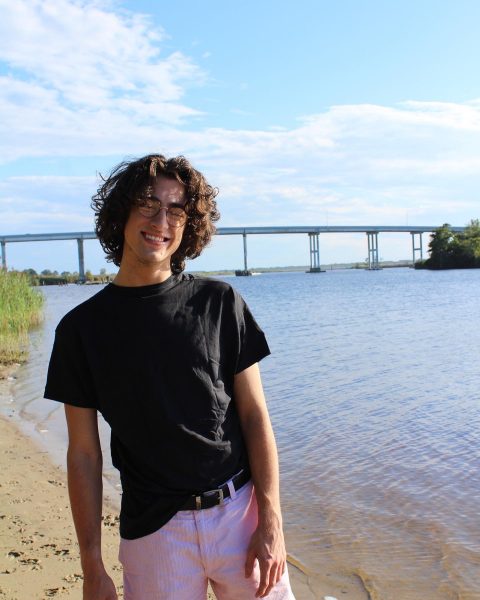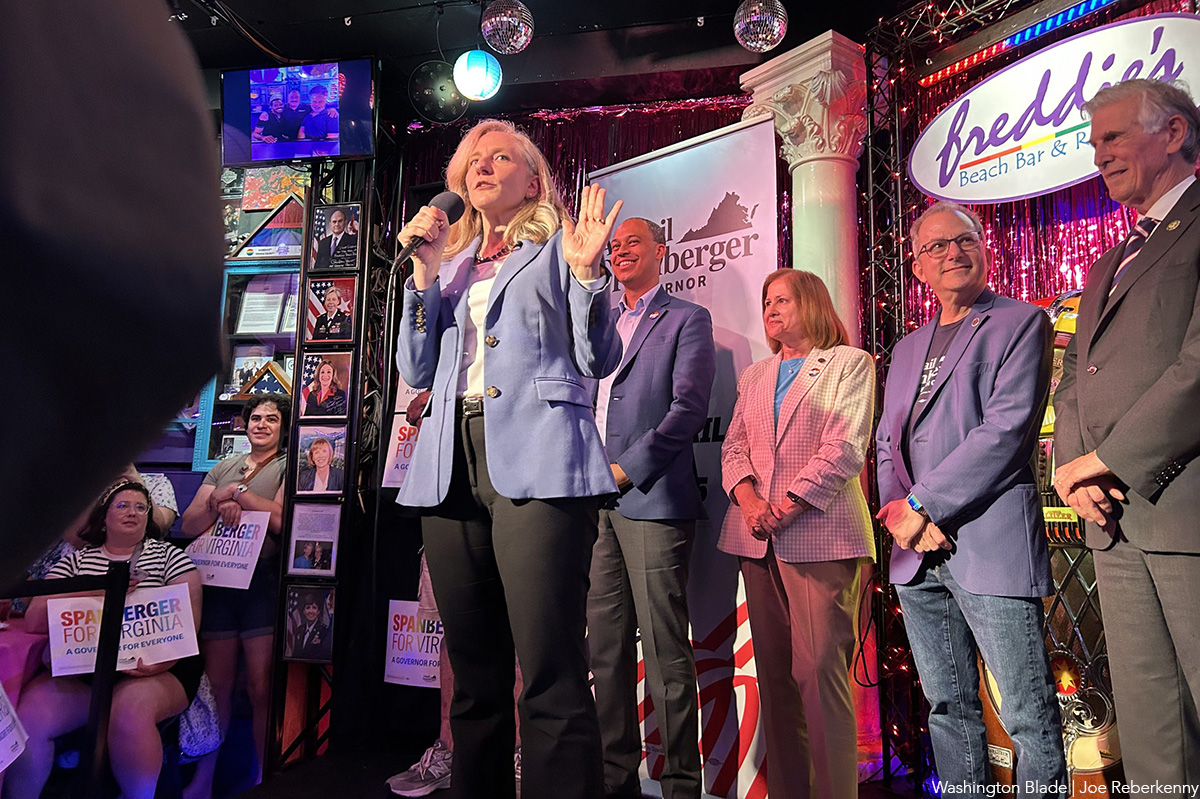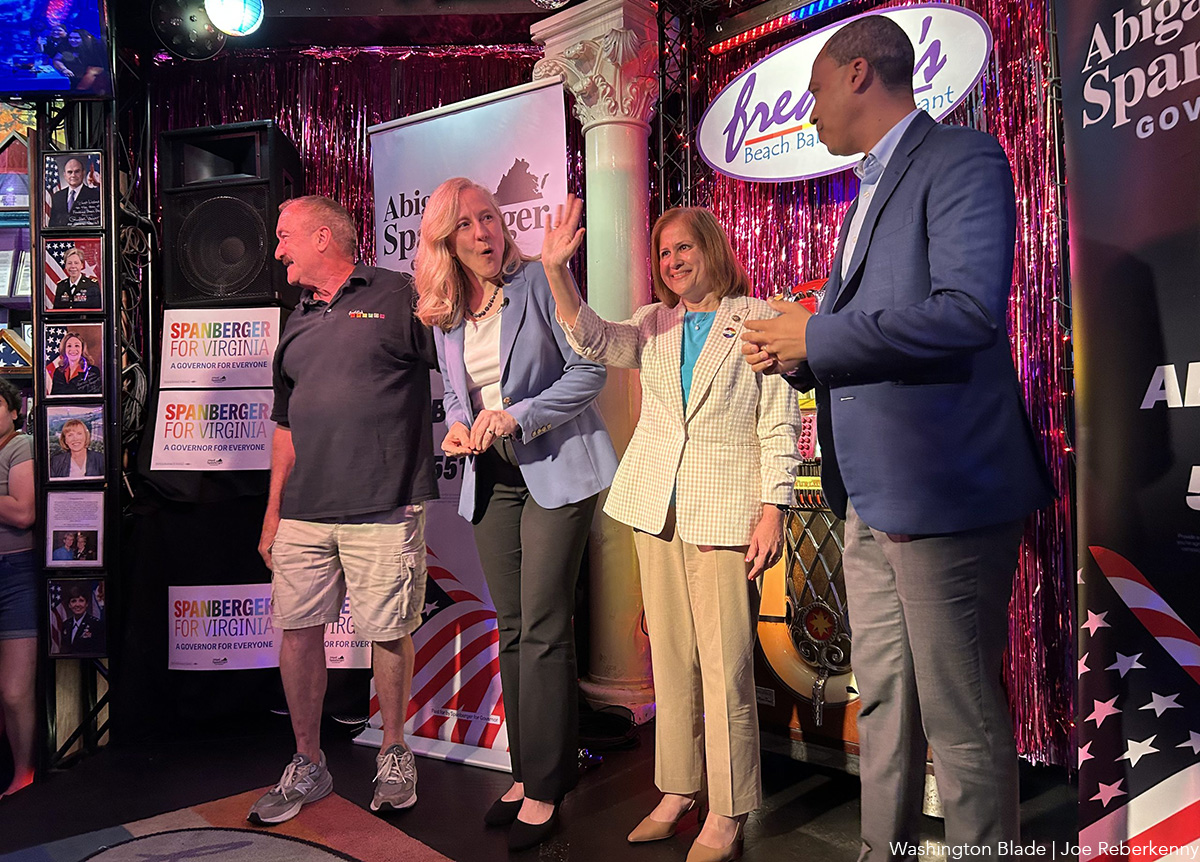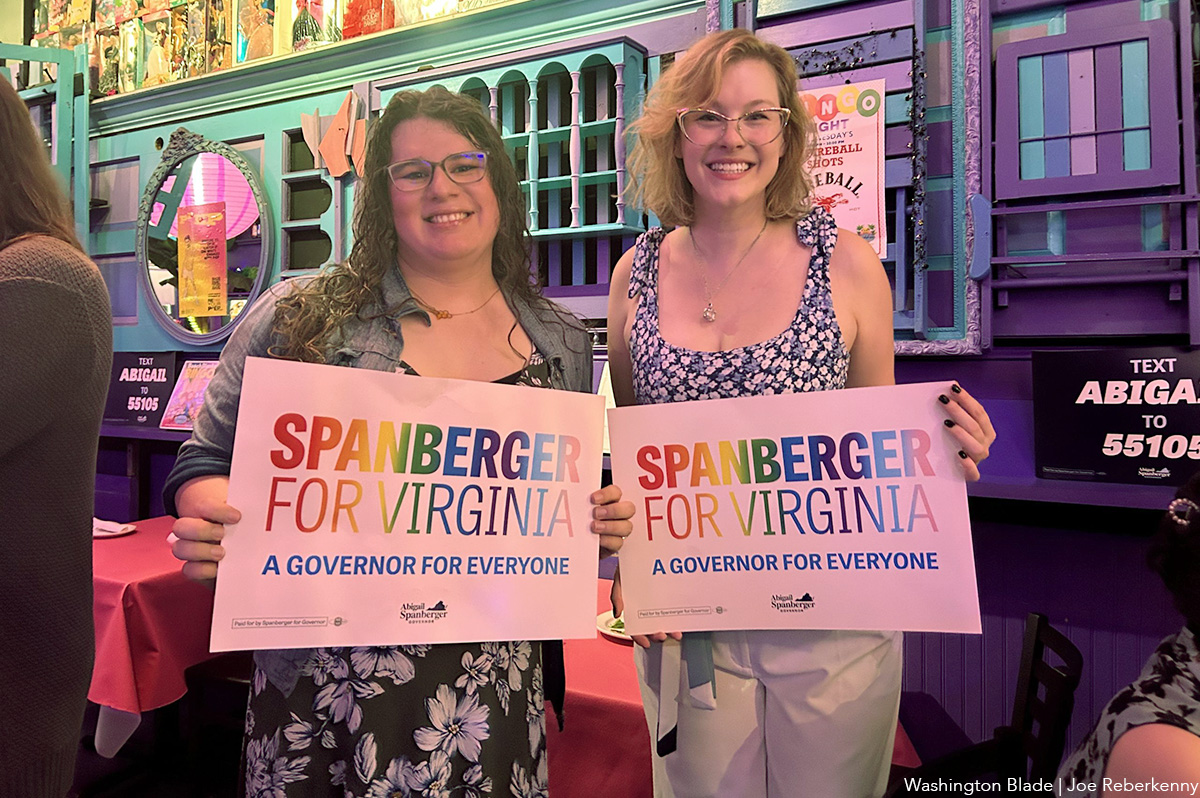Virginia
Gay GenZer wants to be youngest Va. state delegate
Zach Coltrain is running in 98th House district

Zach Coltrain lives in two worlds. In one, he traverses the serene landscapes of Appalachian State University in North Carolina’s Blue Ridge Mountains — studying the use of music as a therapeutic intervention. In the other, he navigates the thorny world of politics in the neighboring state of Virginia, which saw a conservative shift after the election of Republican Gov. Glenn Youngkin in 2021.
Coltrain, a 20-year-old gay Democrat, said those two worlds have coexisted for him since high school — where he split time between the debate team and musicals, campaigning and band practice, politics and music.
“It’s really important to me, solidifying my education with mental health, especially when I let it exist with government, where it appears most people don’t have a strong grasp on how mental health works,” he told the Washington Blade.
The balance will certainly be harder to steer as Coltrain announced his campaign for Virginia’s 98th House of Delegates district in August 2021 — becoming the youngest candidate to run for a seat in Virginia’s lower body. In fact, Coltrain, who grew up in the district, won’t meet the minimum age requirement of 21 until his birthday in September, two months before the election.
Coltrain is joining an ever-growing list of political candidates from Generation Z — defined as those born between 1997 and 2012 — whose older members are just reaching the age where they can legally run for office, 2022 being the first year Gen Z could run in federal elections. And it didn’t take long for Gen Z to get on the board.
On Saturday, Florida Congressman Maxwell Frost, 25, was officially sworn into the U.S. House of Representatives, becoming the first Gen Z congressperson in history.
“The people of Orlando sent me to Washington, D.C., to fight for them and enact the kind of change they want to see in our communities. Gun reform, universal healthcare, housing affordability, tackling the climate crisis and more,” Frost said in a statement. “We have so much work to do, but I’m honored to represent my people.”
In addition, according to campaign finance tracker Open Secrets, Gen Z candidates for federal offices raised millions of dollars during the 2022 campaign season. The nonprofit identified at least seven Gen Z candidates — four Democrats and three Republicans — vying for congressional seats in 2022.
Gen Z is also partially responsible for thwarting the so-called “red wave” that many political analysts predicted for last year’s midterms. In 2022, Democrats overperformed, gaining one seat in the Senate and not losing nearly as many seats in the House as predicted.
Ashley Aylward, a senior researcher at the Washington-based public opinion research firm HIT Strategies, wrote in Time that an “earthquake of young voters shook up the political world” in 2022.
“When young people’s rights are on the ballot and championed by the candidate, they show up,” she wrote.
The numbers seemed to back up her claims. About 1 in 8 voters overall were under 30, according to early exit polling and AP VoteCast, and more than half supported Democratic candidates in the midterm elections. It came during the same year that the U.S. Supreme Court overruled Roe v. Wade, stripping pregnant people of the Constitutional right to an abortion; 74 percent of 18-29-year-olds believe abortion should be legal in all or most cases, according to recent data from the Pew Research Center.
In an interview with the Blade, Aylward couldn’t say definitively whether we could expect a similar turnout of young voters in statewide and local races. Coltrain’s race will be decided later this year — Nov. 7, 2023 — with no headline-grabbing national or gubernatorial elections to help boost turnout.
But Aylward — speaking broadly and making clear she didn’t have enough data to make any clear conclusions — speculated that Dobbs v. Jackson, the case that gave the state’s the power to decide abortion rights, could lead to increased turnout in often overlooked statewide elections.
“I have noticed a shift in attention being turned towards state and local politics, because we know that is where the most impact happens on our day-to-day lives,” she said. “But a lot of it was sparked from the Dobbs v. Jackson case, because people now realize that these decisions about our bodies are going to be made in our state legislatures.”
Aylward added that she hopes to do more research on the topic in the future.
Furthermore, Aylward said she has found that Gen Z voters are “way more motivated to vote when they see young people like them run for office.”
“Most often of what we hear in focus groups is that young people are usually feeling more jaded, because they don’t see people like them in elections, particularly young,” she said.
This begs the question: Can a man not yet able to legally consume alcohol convince the people of Virginia’s 98th House district to vote for him?

In general, Aylward said, she has found that age does matter to some folks. “But most of the time, it boils down to the issues. [Voters] go on and on about the issues that people are championing,” she said.
Coltrain is the only Democrat in the race, clearing his path to the general election. However, his journey to the Virginia House becomes murkier after the primaries. According to the Virginia Public Access Project, Coltrain’s Republican opponent will either be Glenn Davis or Barry Knight — both of whom are current Virginia delegates.
Davis has represented District 84 since 2014, and Knight has represented District 81 since 2010.
The district, which encompasses the southeast corner of the state, did change after redistricting, but it still favors Republicans. The new 98th District is made up of parts of the old 84th, 81st and 21st Districts — all of which favored former President Donald Trump in the 2016 election. In 2021, the 98th District overwhelmingly voted for Youngkin, who captured 63.06 percent of the vote. VPAP categorizes the district as “strong Republican.”
Coltrain admitted that competing in the district worried him, saying there are no guarantees that the district will be flipped. But he believes his campaign is unique and will make him tough competition for his Republican opponent.
Zeroing on Knight, Coltrain criticized the incumbent’s past challengers. “The past few candidates we put up against Barry Knight, my opponent, have been other rich white guys,” he said. “Nobody’s really eating that up.”
“I think that’s not our case, here,” Coltrain added. “I’m a student on a Pell Grant with student aid and a music scholarship, literally barely hanging on financially at points.”
Furthermore, Coltrain touted his campaign issues — which focus on environmental protection, education and healthcare — as a “reflection of both [his] district and also Gen Z in general.”
“I think I found a way to find this niche intersection, where a rural district with farmers in it have the same common interests as Gen Z advocates,” he said. “And I think a big part of that can be the environment.”
As for his opponent using his age against him, Coltrain said, “Honestly, I hope they do.”
“My age is something that I’m going to flip as a good thing, and I have been campaigning with it,” he said. “I started right off the jump telling people that I’m here, and I’m young, and I’m not even old enough to hold the office that I’m running for. I am aware that this is unique, and I’m aware that being the youngest person to run is something that will make people uncomfortable.”
But Coltrain, who has worked on campaigns since he was a teenager, thinks that the “argument that there’s not room for [young people] at the table is not true and won’t be true.”
“I know how to have a real impact in our district,” he said. “I know that specifically, when we’re looking at young activists and organizers, our district is looking for them, tirelessly. I think that this could be a wake up call for us, it can be a way for people my age and people of my generation to realize that this is something that they can do and realize this is the space that they are supposed to exist in.”
Coltrain has no lack of people who believe he could very well be the person to flip the district. In fact, Dr. William “Fergie” Reid, the founder of 90 for 90, an initiative that aims to supply a Democratic challenger in all Republican-controlled districts, reached out to Coltrain directly and encouraged him to run.
Reid — named after his father, William Reid, the first African American elected to the General Assembly in the 20th century — said he was looking for a candidate who was “in college, politically inclined and not scared.” Eventually, he said, “I got his name, and I tracked him down. When I talked to him, he couldn’t have been cooler, and [he] understood what I was talking about.”
In 2021, Republicans swept all three statewide positions — governor, Youngkin, lieutenant governor, Winsome Sears, and attorney general, Jason Miyares — and took control of the House of Delegates in an upset. Youngkin became the first Republican to win a statewide election in Virginia in more than a decade.
Reid said Democrats’ losses in the state were narrow in 2021 and came down to Democrats “not playing hard enough.” To Reid, “if Democrats just play a little bit harder, they’ll take back the majority. And this is what Zach is doing; he’s helping Democrats play just a little bit harder.”
Youngkin has since signed an executive order to root out critical race theory in Virginia’s education system. He has also supported anti-LGBTQ policies, including forcing teachers to out queer students and restricting the rights of transgender students.

Coltrain, who came out as gay when he was 11 years old, said he “was comfortable in telling everybody that I was gay from a really early age.” But “looking at the way things are now, I don’t know that even right now, people could still have that story in the area that I grew up in. And it’s been super, super scary.”
“He’s got the right stuff, and I couldn’t be more proud of him,” he said of Coltrain.
Coltrain is staring down a busy semester, one sure to be full of aching feet and headaches as he’s committed to his campaign, coursework, part-time food truck job and Application State’s debate team, where he is one of two captains.
“It’s a lot for sure,” he said with uncertainty in his voice. “We’re trying to balance it.”
But the brief moment was drowned out by his overwhelming enthusiasm.
“Schoolwork all day and campaigning all afternoon is just normal now,” he said, calling the opportunity “life changing.”
Virginia
Va. court allows conversion therapy despite law banning it
Judge in June 30 ruling cited religious freedom.

In 2020, the state of Virginia had banned the practice of conversion therapy, but on Monday, a county judge ruled the ban violates the Virginia Constitution and Religious Freedom Restoration Act, allowing the therapy to start once more.
The conversion therapy ban, which can be seen in Va. Code § 54.1-2409.5 and 18VAC115-20-130.14, was overturned on June 30 as a result of two Christian counselors who argued that their — and all Virginia parents’ — constitutional right to freedom of religion had been encroached upon when the state legislature passed the ban.
A Henrico County Circuit Court judge sided with John and Janet Raymond, two Christian counselors represented by the Founding Freedoms Law Center, a conservative organization founded in 2020 following Virginia’s conversion therapy ban. Virginia’s Office of the Attorney General entered a consent decree with FFLC, saying state officials will not discipline counselors who engage in talk conversion therapy.
Conversion therapy, as the legislation described it, is considered to be “any practice or treatment that seeks to change an individual’s sexual orientation or gender identity, including efforts to change behaviors or gender expressions or to eliminate or reduce sexual or romantic attractions or feelings toward individuals of the same gender.” The ban’s reversal will now allow parents to subject their children to these practices to make them align better with their religion.
This decision comes despite advice and concern from many medical and pediatric organizations — including the American Psychiatric Association, American Psychological Association, American Association for Marriage and Family Therapy, and the American Counseling Association, to name a few — all of which denounce conversion therapy as dangerous and harmful to those subjected to it.
The American Medical Association, the largest and only national association that convenes more than 190 state and specialty medical societies, says that “these techniques are the assumption that any non-heterosexual, non-cisgender identities are mental disorders, and that sexual orientation and gender identity can and should be changed. This assumption is not based on medical and scientific evidence,” with attached data indicating people subjected to conversion therapy are more likely to develop “significant long-term harm” as a result of the therapy.
The AMA goes as far as to say that they outright “oppose the use of reparative or conversion therapy for sexual orientation or gender identity.”
FFLC has a clear goal of promoting — if not requiring — conservative ideology under the guise of religious freedom in the Virginia General Assembly. On their website, the FFLC argues that some progressive policies passed by the Assembly, like that of freedom from conversion therapy, are a violation of some Virginians’ “God-given foundational freedoms.”
The FFLC has argued that when conservative notions are not abided by in state law — especially when it involves “God’s design for male and female, the nuclear family, and parental rights” — that the law violates Virginians’ religious freedom.
A statement on the FFLC’s website calls gender dysphoria among children a “contagion” and upholds “faith-based insights” from counselors as equal — in the eyes of the law — to those who use medical-based insights. This, once again, is despite overwhelming medical evidence that indicates conversion therapy is harmful.
One study showed that 77 percent of those who received “sexual orientation change efforts,” or conversion therapy, experienced “significant harm.” This harm includes depression, anxiety, lowered self-esteem, and internalized homophobia. In addition, the study found that young LGBTQ adults with high levels of parental or caregiver rejection are “8.4 times more likely to report having attempted suicide,” with another study finding that “nearly 30 percent of individuals who underwent SOCE reported suicidal attempts.”
Virginia Senate Majority Leader Scott Surovell, a Democrat representing Fairfax, said that the overturning of the ban on religious merit disregards the entire concept of having professionally licensed counselors.
“I have no problem if somebody wants to go look at religious counseling from their priest or their minister, their rabbi, their imam — that’s perfectly fine,” Surovell told the Virginia Mercury. “When somebody goes to get therapy from somebody licensed by the commonwealth of Virginia, there’s a different set of rules applied. You can’t just say whatever you want because you have a license. That’s why we have professional standards, that’s why we have statutes.”
Virginia
Walkinshaw wins Democratic primary in Va. 11th Congressional District
Special election winner will succeed Gerry Connolly

On Saturday, Fairfax County Supervisor James Walkinshaw won the Democratic primary for the special election that will determine who will represent Virginia’s 11th Congressional District.
The special election is being held following the death of the late Congressman Gerry Connolly, who represented the district from 2008 until 2024, when he announced his retirement, and subsequently passed away from cancer in May.
Walkinshaw is not unknown to Virginia’s 11th District — he has served on the Fairfax County Board of Supervisors since 2020 and had served as Connolly’s chief of staff from 2009 to 2019. Before he passed away, Connolly had endorsed Walkinshaw to take his place, claiming that choosing Walkinshaw to be his chief of staff was “one of the best decisions I ever made.”
The Democratic nominee has run his campaign on mitigating Trump’s “dangerous” agenda of dismantling the federal bureaucracy, which in the district is a major issue as many of the district’s residents are federal employees and contractors.
“I’m honored and humbled to have earned the Democratic nomination for the district I’ve spent my career serving,” Walkinshaw said on X. “This victory was powered by neighbors, volunteers, and supporters who believe in protecting our democracy, defending our freedoms, and delivering for working families.”
In addition to protecting federal workers, Walkinshaw has a long list of progressive priorities — some of which include creating affordable housing, reducing gun violence, expanding immigrant protections, and “advancing equality for all” by adding sexual orientation and gender identity to the Fair Housing Act.
Various democratic PACs contributed more than $2 million to Walkinshaw’s ad campaigns, much of which touted his connection to Connolly.
Walkinshaw will face Republican Stewart Whitson in the special election in September, where he is the likely favorite to win.
Virginia
Spanberger touts equality, reproductive rights in Arlington
Democratic Va. gubernatorial nominee made campaign stop at Freddie’s Beach Bar

With the general election heating up and LGBTQ rights under increasing threat nationwide, Virginia gubernatorial candidate Abigail Spanberger brought her “Span Virginia Bus Tour” to Arlington’s Freddie’s Beach Bar for a campaign stop filled with cheers, policy pledges, and community spirit.
Spanberger, who served three terms in the U.S. House of Representatives from 2019 through early 2025 for Virginia’s 7th Congressional District, also served as a federal law enforcement officer specializing in narcotics and money laundering cases, and as a CIA case officer working on counterterrorism and nuclear counterproliferation.
Spanberger is running against Republican nominee Winsome Earle-Sears, the current lieutenant governor of Virginia, who said she was “morally opposed” to a bill protecting marriage equality in the commonwealth.
She was joined by other Democratic candidates and supporters: lieutenant gubernatorial candidate Ghazala Hashmi, attorney general candidate Jay Jones, Virginia state Sen. Adam Ebbin (D-Alexandria), and Congressman Don Beyer.

Freddie’s was packed wall-to-wall with supporters, many of whom wore “Spanberger for Virginia” shirts in the progressive Pride flag colors. In her speech, she made it clear that LGBTQ Virginians’ rights are on the ballot this year.
“I’m so excited to be here, and I am so grateful to the entire staff of Freddy’s for letting us overtake this incredible venue that is not just an awesome place to come together in community, but is a symbol to so many people of joy, of happiness, of community and of celebrating our friends and our neighbors,” Spanberger told the packed restaurant. “It is exciting to be here, and particularly during this Pride month, and particularly as we reflect on the 10-year anniversary of Obergefell and the reality that we still have so much work to do.”
“The reality is there are so many people who still would be inclined to take us backwards,” she said. “In this moment when we see attacks on people’s rights, on people’s humanity, on Virginia, on our economy, on research, on public education, on food security, on health care, on Virginians, on their jobs, on public service and on people — it can get heavy.”
“What it does for me is it makes me want to double down, because once upon a time, when I was talking to my mother about some horror show or sequence of activities coming out of a particular administration, she did not really have the patience to listen to me and said ‘Abigail, let your rage fuel you’ — and the conversation was over. And so I reflect on that, because, in fact, every day there is so much fuel to be had in this world and in this moment.”
One of the points Spanberger continued to emphasize was the importance of steadfast state government officials following the election of President Donald Trump, which has led to rollbacks of LGBTQ and bodily autonomy rights as a result of the conservative-majority U.S. Supreme Court.
“What the past few years have shown us is that a Supreme Court decision, no matter how many years we have celebrated its existence, does not protect us in the long term. And so as governor, I will work to make sure that every protection we can put in place for the dignity, the value, and the equal rights of all Virginians is a priority.”
During her speech, Spanberger highlighted several of the key values driving her campaign — protecting reproductive freedom and human rights, lowering healthcare costs, safeguarding Virginia’s environment, and ensuring that public education is affordable, accessible, and rooted in truth, not politics.
Spanberger went as far as to say that she wants to amend the state’s constitution to remove Section 15-A. “The reality is that in Virginia, we still have a ban in our state constitution on marriage equality. It is of the utmost urgency that we move forward with our constitutional amendment.”
“We will work to ensure that that terrible constitutional amendment, that was put in years ago, is taken out and updated and ensuring that Virginia is reflective in our most essential documents of who we are as a commonwealth, which is an accepting place that celebrates the vibrancy of every single person and recognizes that all Virginians have a place, both in that constitution and in law,” she added.
Following the event, two supporters spoke to the Washington Blade about why they had come out to support Spanberger.
“I came out because I needed to show support for this ticket, because it has been a particularly rough week, but a long few years for our rights in this country, in this state, with this governor, and it’s — we need to flip it around, because queer people need protection,” said Samantha Perez, who lives in Ballston. “Trans people need protection. Trans kids need protection. And it’s not gonna happen with who’s in Richmond right now, and we just need to get it turned around.”

“The whole neighborhood’s here. All our friends are here,” said Annie Styles of Pentagon City. “It means the world to me to take care of each other. That’s what a good community does. That’s not what we’ve had with the Republicans here or across the nation for a really long time. It’s time to show that care. It’s time to make sure that good people are in a position to do good things.”
-

 U.S. Supreme Court4 days ago
U.S. Supreme Court4 days agoSupreme Court to consider bans on trans athletes in school sports
-

 Out & About4 days ago
Out & About4 days agoCelebrate the Fourth of July the gay way!
-

 Virginia4 days ago
Virginia4 days agoVa. court allows conversion therapy despite law banning it
-

 Opinions4 days ago
Opinions4 days agoCan we still celebrate Fourth of July this year?










